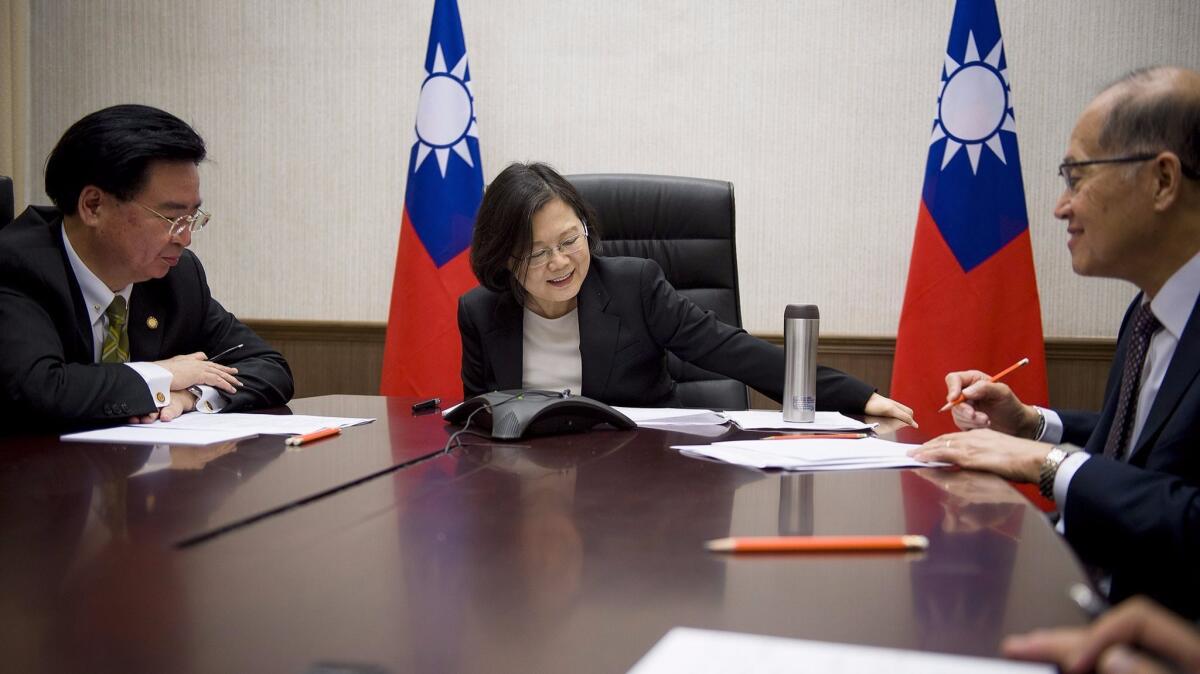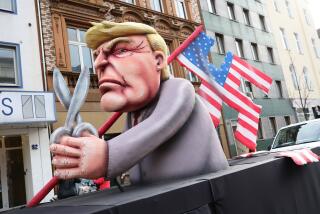Editorial: Trump’s stumbling first steps on the world stage

During the presidential campaign, it became clear that Donald Trump was ignorant about international affairs yet disinclined to close the gaps in his knowledge. He liked to assert that “I know more about ISIS than the generals do,” and he seemed to think that he knew more about diplomacy than the State Department — such as when he assured a television interviewer that Russia’s Vladimir Putin is “not going into Ukraine.” His lack of any foreign policy experience whatsoever combined with his aggressive-yet-ignorant pronouncements was a source of grave concern.
We take no pleasure in saying that his first stumbling steps on the world stage as president-elect have justified that concern.
From his seemingly ill-prepared calls to foreign leaders to his willingness to skip intelligence briefings to his flouting of long-standing protocol surrounding U.S. relations with China and Taiwan, Trump has behaved not as a thoughtful president-in-waiting but as the same shoot-from-the-lip outsider who blustered his way through the campaign. And it isn’t clear whether the president-elect is blundering haplessly into foreign policy mistakes or signaling through tweets and phone calls an intention to change the course of U.S. foreign policy or if he is being manipulated by members his inner circle to advance their own agendas. Each of these is disquieting in its own way.
Was Trump’s telephone conversation with Taiwan’s president meant to signal that he intends to alter the one-China policy ... or was it merely a goof-up?
Meanwhile, the painfully public selection process for the most important member of his foreign-policy team — secretary of State — has come to resemble an episode of “The Apprentice.” Precisely because Trump is so unschooled in foreign affairs and so given to impolitic if not outrageous comments, the choice of the chief diplomat in his administration has taken on outsize importance.
Admittedly, Trump’s words and actions now have less impact than they will once he actually is president. Even so, it has been a month of misfires and missed opportunities.
Trump’s defenders argue that he campaigned for the presidency as a plain talker who has little patience for the diplomatic niceties, and that was fine with the voters who supported him. And so what if he accepted a congratulatory telephone call from President Tsai Ing-wen of Taiwan? As Trump tweeted: “Interesting how the U.S. sells Taiwan billions of dollars of military equipment but I should not accept a congratulatory call.”
Of course, it’s not that simple: Yes, the U.S. sells military equipment to Taiwan; in fact, there is a large and thriving commercial relationship between the U.S. and Taiwan. But since the Shanghai Communique in 1972, the United States has acknowledged that Taiwan is part of China. And since 1979 the U.S. has recognized the Communist government in Beijing as the government of China. Since then no U.S. president or president-elect is believed to have spoken directly with a Taiwanese leader.
So was Trump’s telephone conversation with Taiwan’s president meant to signal that he intends to alter the one-China policy as president or was it merely a goof-up? The Trump team has sent mystifyingly mixed signals. Trump suggested that he simply answered a courtesy call, an idea echoed by Vice President-elect Mike Pence. But the Washington Post reported that the call was the result of planning by pro-Taiwan figures in the Trump transition team, and the Wall Street Journal quoted former Sen. Bob Dole as saying that a law firm he is associated with “may have had some influence” in arranging the call.
If a Trump administration did decide to repudiate the “one China” policy pursued by the U.S. for decades, that would be a provocative and potentially dangerous mistake in our view, but it would be within the president’s discretion. Elections have consequences, as they say, and sometimes the consequences of a presidential election include significant changes in foreign policy. President Obama, for example, reestablished diplomatic relations with Cuba, a break with the practice of predecessors of both parties.
There is a difference, however, between a considered course correction and the impulsive, improvisational attitude Trump has brought to foreign-policy issues as president-elect. The intrigue around his telephone call with the president of Taiwan — as well as the questions raised about his seemingly off-the-cuff phone conversations with the prime ministers of Britain and Pakistan — underline how important it is for the new president to educate himself about international affairs and to assemble a team of advisors who can tell him what he needs to know and when and when not to say (or tweet) what’s on his mind.
Former secretary of Defense and CIA director Leon Panetta has expressed concern about reports that Trump had declined several daily intelligence briefings. Panetta noted that “every president I know — and I worked under nine presidents — every one has taken their intelligence daily brief because that sets the agenda for what you have to focus on as president of the United States.”
That’s the job Donald Trump applied for, and he needs to study for it.
Follow the Opinion section on Twitter @latimesopinion and Facebook
More to Read
A cure for the common opinion
Get thought-provoking perspectives with our weekly newsletter.
You may occasionally receive promotional content from the Los Angeles Times.





